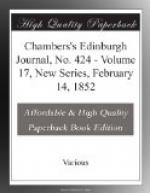At the Revolution of 1789-93, it will be recollected that the laws of primogeniture were overthrown, and it was ordained that in future every man’s property should be divided equally among his children at his death: there can be no doubt that considerations of justice and humanity were at the foundation of this new law of inheritance. Hitherto, there had been a great disparity in the condition of high and low: certain properties, descending from eldest son to eldest son, had become enormously large, and were generally ill managed; while prodigious numbers of people had no property at all, and were dependents on feudal superiors. The country was undoubtedly in a bad condition, and some modification of the law was desirable. Reckless of consequences, the system as it stood was utterly swept away, and that of equal partition took its place. About the same period, vast domains belonging to the crown, the clergy, and the nobility, were sequestrated and sold in small parcels; so that there sprang up almost at once a proprietary of quite a new description. Had the law of equal partition been extended only to cases in which there was no testamentary provision, it could not have inflicted serious damage, and would at all events have been consistent with reason and expediency: but it went the length of depriving a parent of the right to distribute his property in the manner he judged best, and handed over every tittle of his earnings in equal shares to his children. One child might be worthless, and another the reverse; no matter—all were to be treated alike. No preference could be shewn, no posthumous reward could be given for general good-conduct or filial respect. In all this, there was something so revolting to common sense, that one feels a degree of wonder that so acute a people as the French should have failed to observe the error into which they were plunging.
For every law, however bad, there is always some justification or plea of necessity. Besides tending to level the position of individuals, the plan of equal distribution of property was said to be justifiable on the ground that there are more than two parties concerned. Society, it was alleged, comes in as a third, and says to the parent: ’You must provide for this son, however worthless; you must not throw him destitute on our hands; for that is to shift the responsibility from yourself, who brought him into the world, to us, who have nothing to do with him.’ This plea, more plausible than sound, had its effect. That an occasional wrong might not be inflicted, a great national error, practically injurious, was committed.




